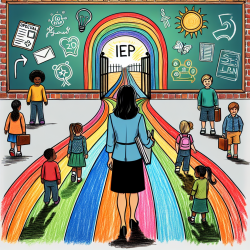Early intervention (EI) is a crucial process aimed at supporting children with developmental disorders from birth to six years of age. According to recent research, the involvement of families, regular education, and early intervention centers can significantly influence the outcomes for children with communication and language disorders. This blog post explores the findings from the study titled "Early Intervention, Regular Education, and Family: Reciprocal Influences on Communication and Language Disorders" and provides practical insights for practitioners to enhance their skills and encourage further research.
The Importance of Family Involvement
Families are the primary caregivers and play a vital role in the development and well-being of children with communication and language disorders. The study highlights that parents who have participated in previous EI interventions exhibit higher resilience compared to those who have not. This resilience is crucial as it helps parents cope with the stress and challenges associated with raising a child with a developmental disorder.
Key Findings
The study found significant differences in resilience between parents who had received previous treatments and those who had not. Additionally, a significant association was found between having no family history of communication and language disorders and the Dysfunctional Parent–Child Interaction subscale from the Parental Stress Index. These findings underscore the importance of previous EI experience in building family resilience and promoting a supportive environment for children.
Practical Implications for Practitioners
Practitioners can take several steps to improve their skills and create better outcomes for children with communication and language disorders:
- Promote Family Involvement: Encourage active participation of families in the intervention process. Provide them with tools and strategies to cope with the challenges associated with these disorders.
- Strengthen Collaboration: Foster collaboration between EI centers and regular educational centers to ensure continuity of programs and strategies used in both contexts.
- Provide Emotional Support: Offer emotional support and counseling to parents, especially those who have no previous experience with EI. This can help reduce their stress levels and improve their ability to interact with their children.
- Raise Awareness: Increase awareness of the specific needs of children with communication and language disorders in mainstream schools. Train school staff to understand and address the challenges faced by these children effectively.
- Encourage Parental Participation: Provide parents with information, resources, and emotional support to enable them to collaborate effectively with teachers and strengthen the intervention process.
Encouraging Further Research
The study also highlights the need for further research to explore the impact of parental resilience and stress on EI interventions. Practitioners are encouraged to engage in research activities to better understand the factors that influence the success of these interventions and develop more effective strategies to support families and children.
In conclusion, early intervention, regular education, and family involvement are critical components in supporting children with communication and language disorders. By promoting family resilience and providing the necessary support, practitioners can create a positive impact on the lives of these children and their families.
To read the original research paper, please follow this link: Early Intervention, Regular Education, and Family: Reciprocal Influences on Communication and Language Disorders.










